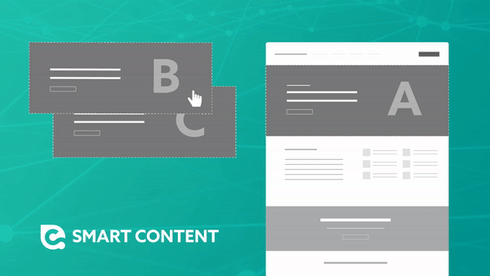As a marketer, you want to make sure that the content you create stays with them. But chances of standing out in the crowd are meagre.
Why?
Because
- there's a lot of content out there on the web
- you might not know what your visitor is looking for, so you are showing standard content
- those of your competitors who do know the visitor needs and preferences have already started working on personalization
While the value of personalization is clear, the task can be overwhelming to get started with. If your digital property is on Drupal, you can begin with some of the content personalization modules to yield higher ROIs.
But you must know the challenges before conquering them.
The Challenges with Content Personalization
Personalized messaging not only yields higher ROI but gets you more loyal customers. 45% of online users are more likely to shop on a website that shows personalized suggestions.
According to a 2017 research lack of resources (42 percent) and research data (23 percent) remain top challenges for marketers in implementing personalization.
Developing Content
Content is the only component that's hyper-relevant to the concept. Catering a tailored experience means dynamic and coordinate messaging across multiple digital channels. The content cannot be isolated.
Having the right content strategy in place is crucial.
Adding personalization to the mix, you’re dealing with the need for individualized content that fuels and satiates the psychological wants for different segments and personas.

In order to recommend that ebook on DevOps Consulting to a CTO, you need to have the basic content around.
Gathering the Right Data
While marketers realize that a data audit is important to understand the users, what remains a challenge is which data to refer to. For an effective implementation various pieces of customer data need to be brought together to assemble a complete view of the customer.
With a larger 'data lake' at work, identifying a single source of customer truth gets tougher.
A Hubspot research found that targeted and personalized CTAs had a 42% higher view-to-submission rate than the ones that were the same for every user.
Well, it all can start off small with modules.
Content Personalization With Drupal
A big part of improving user experience comes down to validating the content on your website. Drupal already gives us structured content. Further, there is no restriction on which marketing tools you apply as the Drupal managed content can be turned into standardized data sharing formats with its API-first approach.
- Taxonomy: Taxonomy is the practice of classifying content. It is beneficial as it helps define the vocabulary for everything from menu and navigation schemes to view and display options.
In Drupal 8, it is a core module which allows you to connect, relate and classify your website’s content. Taxonomy is important for personalization as it helps build associations between your personas and the personalized content you’ve created.
It enable native or third-party personalization tools to identify and pick the right content to showcase to the right user.
This is most effective for making intelligent content recommendations content to the visitor. The vocabulary ensures your targeted persona is seeing all the content that's contextually relevant to their historical behaviour on your site. - Smart Content Module: Moving a step beyond taxonomy, you would want to display targeted content that speaks directly to your prospect, to tip the conversion scales. The Smart Content module, can integrate with any data source to help you deliver segmented content based on industry, buyer stage, location or other crucial segments.

The module is most effective in conjunction with Smart Content Blocks and Smart Content Segments.
- Smart Content Blocks allow you to insert a Smart Block on any page in order to hide/show/swap content within that block, based on the conditions set. They can be added anywhere that traditional content blocks can be placed.
- Smart Content Segments allow you to create, save and manage sets of conditions, called segments. Smart Blocks can use any segment(s) to display the corresponding content. For example, conditionally displaying a Smart Block if it's the user’s first time on the site or conditionally displaying a Smart Block to a mobile user.
- Acquia Lift: Providing a suite of tools for content personalization, Acquia Lift helps you create contextual digital experiences. It merges content and customer data into one tool, empowering organizations to deliver the most cohesive and personalized experiences across multiple channels and devices.
Among its other features, Acquia Lift includes content syndication giving organizations the ability to use content from anywhere to personalize across any digital platform, including Drupal and non-Drupal sites. It has functionalities like drag-and-drop user interface for targeting messages, syndicating content, behavioural targeting, A/B testing, unifying customer profile, and combining anonymous and known online visitor profiles.
It has functionalities like drag-and-drop user interface for targeting messages, syndicating content, behavioural targeting, A/B testing, unifying customer profile, and combining anonymous and known online visitor profiles.
With the ability to target audiences in real-time, marketers can scale their web personalization efforts in order to drive conversions and bottom-line results.
This gives digital marketers more control over automation, testing and measurement of marketing activities.
Wrapping Up
At the enterprise level, Drupal has personalization tools and features built right in. So you can show the most relevant message to each of your visitors.
And while setting up personalization can look daunting, Srijan is always at your service to realize your digital business goals. Our work with one leading US media conglomerate and Estee Lauder is a testimony of our customer service and expertise in Drupal.
Looking to enhance your customer experience and drive more conversions? Speak to our team of experts to explore how to get started.
Our Services
Customer Experience Management
- Content Management
- Marketing Automation
- Mobile Application Development
- Drupal Support and Maintanence
Enterprise Modernization, Platforms & Cloud
- Modernization Strategy
- API Management & Developer Portals
- Hybrid Cloud & Cloud Native Platforms
- Site Reliability Engineering




